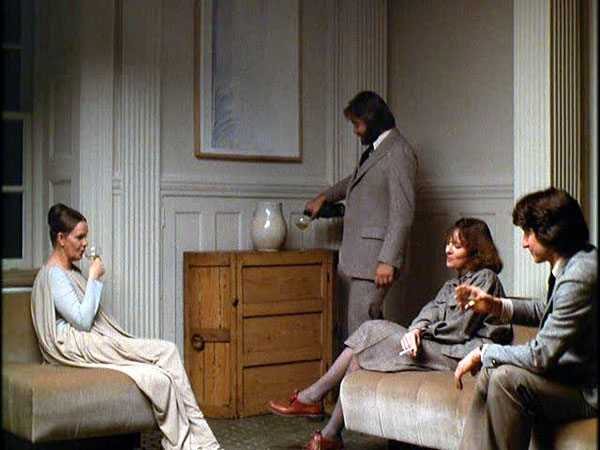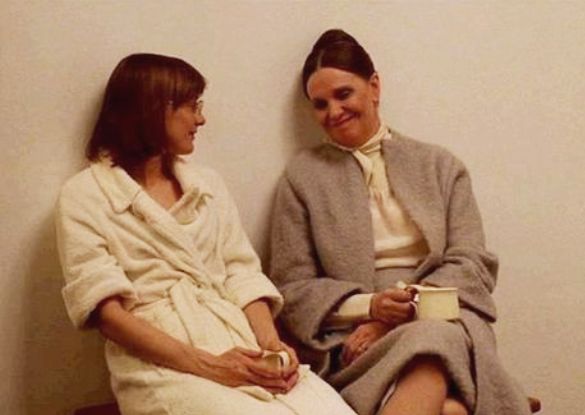← Back to Reviews
in

Director and writer Woody Allen, whose early career was predicated on writing and producing laughs onscreen, made his first foray into drama with the 1978 film Interiors, a scorching, uncompromising, dark and voyeuristic drama that was Woody's homage to his cinematic mentor, Ingmar Bergman, who Woody has actually referred to onscreen as "the only true genius in cinema". This look at family dysfunction at its zenith was groundbreaking movie making due to Woody's unapologetic screenplay, his keen directorial eye and a knack for casting the last actor you would expect in a certain kind of role and making it work.
The film centers on an affluent New York family who we meet as the family patriarch, Arthur (E.G. Marshall), quietly announces one morning at the breakfast table that he wants a trial separation from wife, Eve (Geraldine Page), an event that sends not only Eve, but Arthur and Eve's three daughters' lives into a tailspin.

Joey (Mary Beth Hurt) is Arthur's pet and happily married, but has been unable to find a career that she is either happy with or can be successful with. Flyn (Kristin Griffith) is an actress who has been out of the family loop for awhile because she is always on location working somewhere. Renata (Diane Keaton) is an extremely successful writer who is married to a writer (Richard Jordan) who is nowhere near the success his wife is, which is probably why he drinks heavily and has been harboring a secret crush on his sister-in-law Flyn. Things get ugly because the daughters refuse to accept the possible end of their parents' marriage, despite Arthur's history of infidelity. Things get even uglier when Arthur brings a new woman named Pearl (Maureen Stapleton) to a family function and announces his plans to marry her.

In many of my reviews, I have often spoken about characters that speak "without filter" but I think this is the film where it originated...I have never seen family members speak to each other with such insensitivity and cruelty without a second thought. Arthur's matter of fact attitude when he announces he wants out of his marriage is undeniably disturbing. He is so upset that favorite daughter doesn't approve of his decisions but every time he speaks to anyone else about her, all he does talk about what a disappointment she has been to him. Renata's arrogance as the most successful member of her family and her boredom with everyone depending on her, not to mention the emasculation of her husband is startling and Eve's emotional blinders about the end of her marriage and her refusal to accept her part in it is alternately annoying and heartbreaking. These are angry, insensitive, and callous people who happen to be family, but absolutely nothing that happens during this 90 minutes comes off as false or affected.
Allen's genius at creating sympathy for unsympathetic characters works in his casting...Arthur is one of the most reprehensible characters that I've ever seen, but the casting of E.G. Marshall in the role and his subtle underplay made the character fascinating to watch. The way the story is constructed, the character of Pearl is supposed to be the alleged villain of the piece, but Maureen Stapleton brings such a vivacious and rich quality to the character (with the help of Allen's writing of the character) that there is no way you can hate Pearl. Eve is a foolish and slightly pathetic character, but with Geraldine Page in the role, you forget that very quickly.
Allen's genius as a director is evident in every frame...one of the most startling directorial touches I noticed here was that with the exception of a single party scene where characters are dancing with each other, the film has no music score at all...the power of the storytelling here drives the film and until the scene with the music happened, it didn't even occur to me that the film had no music and I really didn't miss it, which I found very ironic because Woody's taste in music has always been flawless, always picking the right music for the right scene.

Allen also knows how to draw powerful performances from his cast and this film is no exception...Page, an actress who was incapable of giving a bad performance, is magnificent in a performance that earned her an Oscar nomination for lead actress and Stapleton's sparkling turn as Pearl earned her a supporting nomination. Marshall is a revelation as Arthur and Keaton's interpretation of a very complex character is powerhouse.
If you want to see where films like Crimes and Misdemeanors, Another Woman, and Husband and Wives came from, check out this early masterpiece of the master, which certainly should have won Allen a screenplay Oscar. This is a must-see for serious students of cinema.
Director and writer Woody Allen, whose early career was predicated on writing and producing laughs onscreen, made his first foray into drama with the 1978 film Interiors, a scorching, uncompromising, dark and voyeuristic drama that was Woody's homage to his cinematic mentor, Ingmar Bergman, who Woody has actually referred to onscreen as "the only true genius in cinema". This look at family dysfunction at its zenith was groundbreaking movie making due to Woody's unapologetic screenplay, his keen directorial eye and a knack for casting the last actor you would expect in a certain kind of role and making it work.
The film centers on an affluent New York family who we meet as the family patriarch, Arthur (E.G. Marshall), quietly announces one morning at the breakfast table that he wants a trial separation from wife, Eve (Geraldine Page), an event that sends not only Eve, but Arthur and Eve's three daughters' lives into a tailspin.

Joey (Mary Beth Hurt) is Arthur's pet and happily married, but has been unable to find a career that she is either happy with or can be successful with. Flyn (Kristin Griffith) is an actress who has been out of the family loop for awhile because she is always on location working somewhere. Renata (Diane Keaton) is an extremely successful writer who is married to a writer (Richard Jordan) who is nowhere near the success his wife is, which is probably why he drinks heavily and has been harboring a secret crush on his sister-in-law Flyn. Things get ugly because the daughters refuse to accept the possible end of their parents' marriage, despite Arthur's history of infidelity. Things get even uglier when Arthur brings a new woman named Pearl (Maureen Stapleton) to a family function and announces his plans to marry her.

In many of my reviews, I have often spoken about characters that speak "without filter" but I think this is the film where it originated...I have never seen family members speak to each other with such insensitivity and cruelty without a second thought. Arthur's matter of fact attitude when he announces he wants out of his marriage is undeniably disturbing. He is so upset that favorite daughter doesn't approve of his decisions but every time he speaks to anyone else about her, all he does talk about what a disappointment she has been to him. Renata's arrogance as the most successful member of her family and her boredom with everyone depending on her, not to mention the emasculation of her husband is startling and Eve's emotional blinders about the end of her marriage and her refusal to accept her part in it is alternately annoying and heartbreaking. These are angry, insensitive, and callous people who happen to be family, but absolutely nothing that happens during this 90 minutes comes off as false or affected.
Allen's genius at creating sympathy for unsympathetic characters works in his casting...Arthur is one of the most reprehensible characters that I've ever seen, but the casting of E.G. Marshall in the role and his subtle underplay made the character fascinating to watch. The way the story is constructed, the character of Pearl is supposed to be the alleged villain of the piece, but Maureen Stapleton brings such a vivacious and rich quality to the character (with the help of Allen's writing of the character) that there is no way you can hate Pearl. Eve is a foolish and slightly pathetic character, but with Geraldine Page in the role, you forget that very quickly.
Allen's genius as a director is evident in every frame...one of the most startling directorial touches I noticed here was that with the exception of a single party scene where characters are dancing with each other, the film has no music score at all...the power of the storytelling here drives the film and until the scene with the music happened, it didn't even occur to me that the film had no music and I really didn't miss it, which I found very ironic because Woody's taste in music has always been flawless, always picking the right music for the right scene.

Allen also knows how to draw powerful performances from his cast and this film is no exception...Page, an actress who was incapable of giving a bad performance, is magnificent in a performance that earned her an Oscar nomination for lead actress and Stapleton's sparkling turn as Pearl earned her a supporting nomination. Marshall is a revelation as Arthur and Keaton's interpretation of a very complex character is powerhouse.
If you want to see where films like Crimes and Misdemeanors, Another Woman, and Husband and Wives came from, check out this early masterpiece of the master, which certainly should have won Allen a screenplay Oscar. This is a must-see for serious students of cinema.
